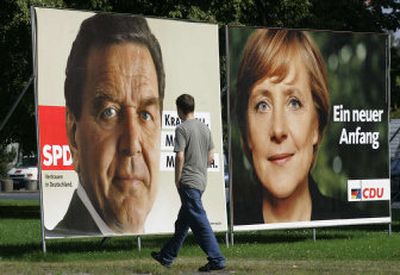Challenger to Schroeder would strengthen U.S. ties

BERLIN – Germany is headed into national elections that could usher in major changes: If conservative challenger Angela Merkel beats Chancellor Gerhard Schroeder, the result would likely be closer ties to Washington, especially on issues such as Iraq.
It could also weaken the Franco-German power axis at the heart of “Old Europe” that has bedeviled the Bush administration.
Many believe Merkel, who grew up in communist East Germany, will bring back some of the outlook of her one-time political patron, former conservative chancellor Helmut Kohl, who valued strong U.S. relations.
She has pledged while campaigning for the Sept. 18 elections to “put Europe’s relationship with the USA back on a sensible footing” and to “reinvigorate” U.S.-German relations.
But she has also kept a low profile on foreign relations, knowing that Schroeder’s strident opposition to the war in Iraq helped him narrowly win re-election in 2002 and remains a popular stance.
On Iraq, she cautiously says only that she will continue Schroeder’s help in training Iraqi police outside the country.
Still, few doubt the former physicist would get along better with President Bush, given her conservative party background and the more positive statements she has made about the United States in the past.
“There will be significant changes in style as well as in substance,” said Jan-Friedrich Kallmorgen, an expert on trans-Atlantic relations at the German Council on Foreign Relations.
“Schroeder remains just persona non grata in certain circles, especially the White House. There cannot be a normal relationship while he’s chancellor. … Her DNA is more trans-Atlantic.”
For its part, Washington has made little secret of its preference for Merkel. When her foreign policy adviser, Wolfgang Schaeuble, visited Washington, he got time with Bush as well as Secretary of State Condoleezza Rice and National Security Adviser Stephen Hadley.
Merkel’s party, the Christian Democratic Union, is leading with about 42 percent in the polls, followed by Schroeder’s Social Democrats at about 34 percent. That in itself does not guarantee victory: She would have to put together a majority in parliament, possibly in coalition with the smaller Free Democrats.
If those two parties fall short, she might have to agree to a coalition with Schroeder’s Social Democrats. .